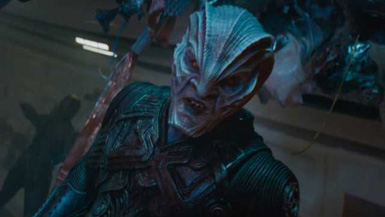|
|
Movie Review: Star Trek BeyondBy Ben GruchowJuly 28, 2016
This film does a little rudimentary exploration of the effects of time passing unnoticed, and how a short time can become a very long time with very little apparent difficulty. This manifests itself explicitly with some of the later details in the Krall storyline, and obliquely with the subplots and sometimes just the little things relating to the Enterprise crew. There is also poignancy in these details; this was one of the final films of the late Anton Yelchin, who plays Pavel Chekov, and there are two moments that seem to honor him. One involves a drink between Kirk and the ship’s medical officer, McCoy (Karl Urban); McCoy has confiscated a bottle of whiskey from Chekov’s locker, and the quiet toast that follows infers more meaning than it normally would have. This may have been unintentional; less so is a later moment that involves a cut to Yelchin during a key line. This is an agreeably intimate and informal film, for one with a budget well into nine figures. Apart from the sporadic action sequences, which are variable in their scope and effect (the crash-landing of the Enterprise is a marvelous sequence, landing with surprising precision the chaos of attempting to solve a dozen little immediate crises at once, while the big crisis occurs unchecked in the background; the opening sequence, involving the first appearance of the Abronoth, is offputting and clumsy, and is mostly responsible for the uncertain note the movie starts off on), this is an interpersonal drama, inhabited by actors who comfortably understand the nature of their characters if not every dimension, that happens to take place against science-fiction trappings and backgrounds.
|

|
|
|

|
Friday, November 1, 2024
© 2024 Box Office Prophets, a division of One Of Us, Inc.


